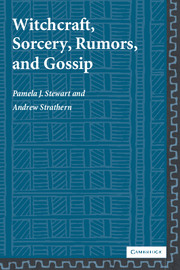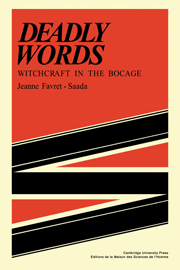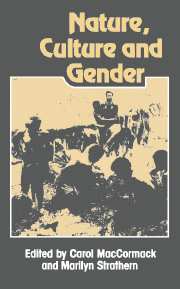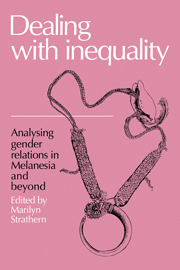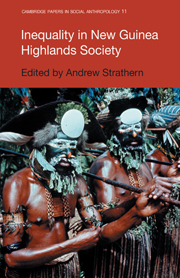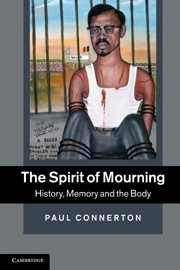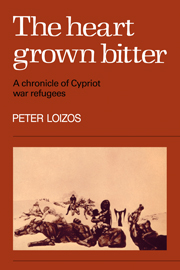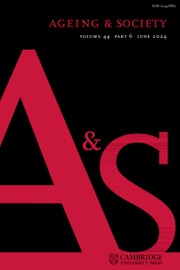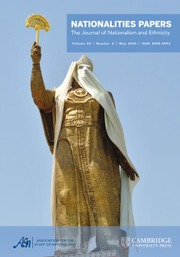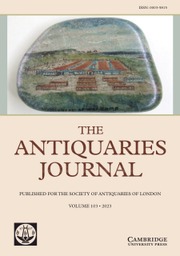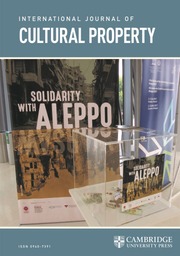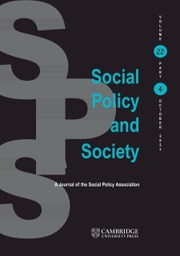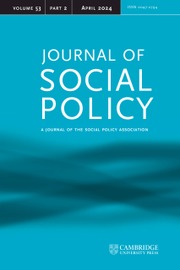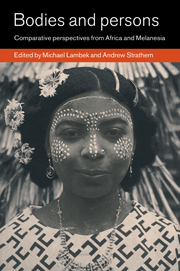Witchcraft, Sorcery, Rumors and Gossip
£55.00
Part of New Departures in Anthropology
- Authors:
- Pamela J. Stewart, University of Pittsburgh
- Andrew Strathern, University of Pittsburgh
- Date Published: January 2004
- availability: Available
- format: Hardback
- isbn: 9780521808682
£
55.00
Hardback
Other available formats:
Paperback, eBook
Looking for an inspection copy?
This title is not currently available on inspection
-
Witchcraft, Sorcery, Rumors, and Gossip combines two classic topics in social anthropology in a new synthesis: the study of witchcraft and sorcery and the study of rumours and gossip. It shows how rumour and gossip are invariably important as catalysts for accusations of witchcraft and sorcery, and demonstrates the role of rumour and gossip in the genesis of social and political violence, as in the case of both peasant rebellions and witch-hunts. Examples supporting the argument are drawn from Africa, Europe, India, Papua New Guinea, Sri Lanka, and Indonesia. They include discussions of witchcraft trials in Essex, England in the seventeenth century, witch-hunts and vampire narratives in colonial and contemporary Africa, millenarian movements in New Guinea, the Indian Mutiny in nineteenth-century Uttar Pradesh, and rumours of construction sacrifice in Indonesia.
Read more- Links witchcraft, rumors, and the production of violence in a single analysis
- Uses case materials from many different parts of the world
- Written in a clear, accessible style for students, scholars, and general readers
Reviews & endorsements
'The topic of witchcraft needs up-dating in exactly this way. Witchcraft beliefs are too often studied in an arcane anthropological bye-water, but this approach offers a wide synthesis of an important field.' Mary Douglas, University College London
See more reviews'These themes are of great relevance today …'. Oxfam's Development Resources Review
'… a brave and original attempt by a pair of anthropologists specializing in the study of New Guinea to introduce a new element into the analysis of that most elusive of concepts, 'witchcraft', by relating studies concerning various times and places to patterns of gossip and rumour. The general model [used is that] … all human communities indulge in gossip and spread rumours. When the gossip about a person gets sufficiently unpleasant, or perhaps when there is a clear threat against an entire society … the targets of hate speech are liable to become the victims of direct verbal or even physical attack … Where anthropological and historical specialists on 'witchcraft' risk going in different directions, each being too little aware of the existence of the other, Stewart and Strathern are admirably open-minded and inclusive. There is no better book for those who want to think about 'witchcraft' not as a curious and outmoded folly, but as something that is considered by many to exist, and which bears an uncomfortable relationship to forms of perceived deviance that are all too common in the most scientifically advanced countries, and can lead to forms of persecution that are all too tragic.' Stephen Ellis, Afrika-Studiocentrum, Leiden
Customer reviews
Not yet reviewed
Be the first to review
Review was not posted due to profanity
×Product details
- Date Published: January 2004
- format: Hardback
- isbn: 9780521808682
- length: 246 pages
- dimensions: 229 x 152 x 17 mm
- weight: 0.41kg
- contains: 6 b/w illus.
- availability: Available
Table of Contents
1. Witchcraft and sorcery: modes of analysis
2. Rumours and gossip: an overview
3. Africa
4. India
5. New Guinea
6. European and American witchcraft
7. Rumours and violence
8. Conclusions: conflict and cohesion.
Sorry, this resource is locked
Please register or sign in to request access. If you are having problems accessing these resources please email [email protected]
Register Sign in» Proceed
You are now leaving the Cambridge University Press website. Your eBook purchase and download will be completed by our partner www.ebooks.com. Please see the permission section of the www.ebooks.com catalogue page for details of the print & copy limits on our eBooks.
Continue ×Are you sure you want to delete your account?
This cannot be undone.
Thank you for your feedback which will help us improve our service.
If you requested a response, we will make sure to get back to you shortly.
×
